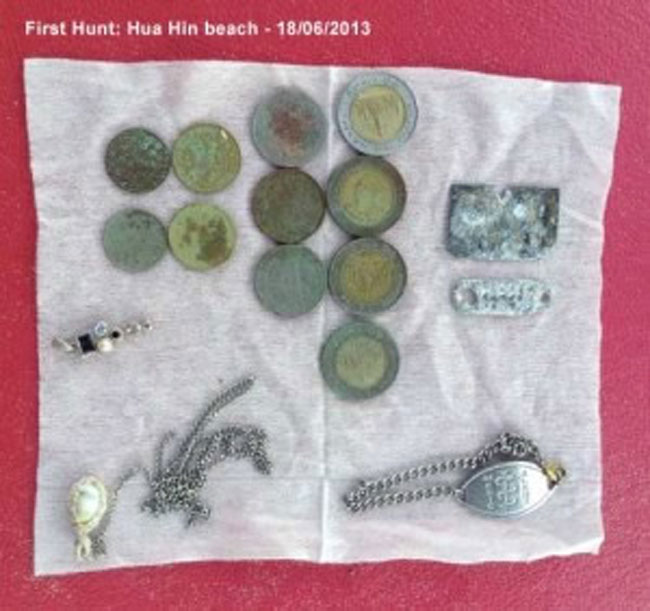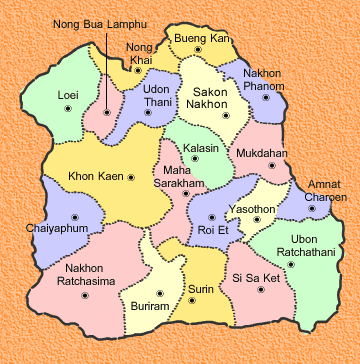Metal detecting has always appealed to me, although I never did it as a child or teenager.
The idea of finding treasure is alluring, but that for me isn’t the sole motivation. I am a fan of history and find anthropology fascinating.
Finding bits of history, whether coin or relic, is interesting because it makes you wonder who sat here, who lived here, what type of people were they, what were they doing and why were they here?
There’s also something fascinating about the fact that day in day out people walk over a particular spot, possibly for decades, and then with just one dig, a few inches down, a piece of history is unearthed that they had no idea was there.
And so, a year ago, I decided to buy myself a metal detector. I tested it out in my garden and a local field in the UK, but the beeps led to dead ends.
I needed to find some potentially more lucrative sites, and increase my knowledge and experience.
My main intention for buying the machine was to do some metal detecting in Thailand on the beaches. Sadly I forgot to bring it when I went to Phuket last December, and most of my travel has been urban-orientated since.
Then, two weeks ago, a friend suggested a trip to Hua Hin.

Metal Detecting In Hua Hin
It was only because my wife asked me whether I was taking my detector that I remembered to pack it the night before we left.
I was excited, but being inexperienced I pretty much expected to come up short.
However, the first day really surprised me.
My friend suggested scanning an area of the beach just in front of some big old properties that line the beach; his theory being that in the past wealthy people may have relaxed there when the tide was high.
Immediately we detected a few old one Baht coins. And over the following couple of hours we found some interesting bits.
The most valuable find of the day was a silver pendent (925 stamped) with a pearl inside and a couple of other stones I am yet to identify. My friend is credited with that find, though, as he was holding the detector at the time.
I also found a junk chain with a shell encased in rope, some ten Baht coins, a few five Baht coins and someone’s asthma medic bracelet – it’s from the UK so I’ll try and return it by calling the number when I get home.
Excited by what the first day had dug up, I went home and did some online research. Videos on YouTube and comments on blogs suggested looking in harder, more compact sand, there was also advice about reading the tide lines and gulleys which I didn’t quite understand.
Some suggested looking among shell deposits, and the obvious advice of looking around areas frequented by tourists, like sunbeds and beach restaurants.
Armed with this knowledge I thought I’d do better, but I didn’t…
I choose to detect in the section in front of the Hilton Hotel and about 150 metres either side. But the compact sand near the shoreline frustrated me.
I was getting beeps at 8-10 inches that always led to nothing, and became convinced the sand or rocks below the surface contained some metal compound that I couldn’t discriminate through sensitivity.
I looked around rocks, shell-laden areas and deckchairs, and found nothing. I then moved to the back of the beach again, along the wall, and found a few coins totalling eight Baht.
A guy on the beach said that occasionally a local metal detector club comes down and works the same area, so perhaps that was a factor in the finds being few and far between; apparently one of them had recently found a gold watch.
But then perhaps my inexperience led me to become frustrated and too sporadic with my search. I just can’t “read the beach”, which apparently is a real skill that takes a long time.
Still, my total time metal detecting in Thailand has been around 4-5 hours, and I have at least made a handful of finds, one pretty good at that.
What would be cool is if next time I could go out with someone with experience who could show me some basic skills. I think I got to grips with my detector pretty well.
I am using a Bounty Hunter Quick Draw 2, which is not a high-end machine but a solid entry machine for newbies and occasional hobby hunters.
It gets good reviews and has a good auto-detecting functionality, a plus for those who want to get straight into the treasure hunt. It is also reasonably priced. I got a pointer and a carry bag with it for less that £200.
I will take this experience and hopefully get out treasure hunting again soon. I am interested in other places Thailand that are good for detecting.
I doubt there’s anywhere in Bangkok to detect, so I guess beaches are the main attraction for expats and travellers metal detecting in Thailand.
Tips for Metal Detecting In Thailand
If you are an experienced detector, perhaps you can give me some tips:
Here are some questions I have:
1. Where to Search?
With the type of detector I have, should I stick to a specific type of terrain?
I have seen some people with metal detectors scanning shallow water and the compact sand by the shoreline, but would my detector be good enough for this?
The only luck I seem to have is finding coins in loose sand a few inches down. Is this because my detector is fairly entry-level, even though it was a couple of hundred pounds?
I'm not too hung up on finding expensive things or valuable relics but rather having fun and making regular fines. Now I have my young daughter she gets excited then disappointed when nothing is dug up for an hour or more, and of course loses interest.
Does anyone have any tips on places or areas of the beach or park where you can kind of guarantee that I will have some luck, even if it is just a few low value coins?
Perhaps a better question is where am I definitely wasting my time on a beach? Would I be right to continue the same strategy I had in Hua Hin where I was searching at the back of the beach in the loose sand?
2. Best Technique?
When I was back in the UK recently visiting West Wittering beach I saw a guy detecting and he had a specific technique of sweeping: he would mark the area he was sweeping by making a dig in the sand with his shovel, essentially creating a grid so he knew exactly where he had covered.
I also noticed he was swinging his detector quite wildly from side to side and moving very quickly. He was definitely experienced and his detector looked pretty high end, but I wonder, for someone like me, should I be going very slowly or is the quick swinging motion not an issue?
3. Any Essential Accessories?
Are there any accessories that are really worth investing in that can help speed up the process of searching, such as a type of shovel or sieve?
4.How to Deal with Unwanted Attention?
And lastly, how do you deal with people who come up and ask questions and then follow you around anticipating you digging something up?
I know people are really interested and obviously kids get excited, but I found this really off putting. I quite enjoy the mindfulness of searching and when not doing it with my daughter I like to zone out and just be in the moment of what I am doing.
When I have a couple of people following me around waiting for me to dig up something valuable and getting disappointed when I don't starts to ruin the experience and makes me anxious to find something quickly to her prove that this actually works.
Last Updated on



Rick says
Nov 22, 2024 at 10:22 pm
Curt says
I brought a Whites PI over years ago and stored it at my wife's mothers house. She stashed it on top of a cabinet on the top floor of her home. All the soft rubber rubber seals had baked and rotted, making it useless for he surf. As a an PI, it's pretty much useless elsewhere
I will never make it to the beach. But, I can imagine all the Thai gold lying in the surf line.
Hopefully, your detector is waterproof. May I ask what machine you brought with you?
Be careful where you detect and keep very aware of people around you. Don't show off any great things you may have. Even in the States, when asked, I always just showed my trash pouch.
A foreigner with a metal detector can be an easy target. In Thailand, much of the beaches are considered some peoples' "turf".
Nov 23, 2024 at 7:46 am
Harold says
Nov 30, 2022 at 4:41 am
Alan Hanson says
Dec 16, 2022 at 8:57 am
Urs says
May 03, 2023 at 8:20 pm
Emma says
May 13, 2023 at 3:04 pm
TheThailandLife says
May 15, 2023 at 9:42 pm
Trevor says
Go to spots where people go. Sounds obvious. Particularly where they sit down - that's where money and other valuables are either dropped or put down and not retrieved. That's why beaches are good but places used as picnic spots in parks are also a good option.
The tide line thing... Items dropped on a beach will tend to migrate over time down the beach to the point where the tide washes up to. The tide will keep depositing items back at the top of its travel so they won't typically get any lower than this.
Accessories? Definitely a small spade. Maybe a course plastic sieve for the beach - shovel the sand dug out of a hole into it. If you get serious, get a small hand detector - the big one makes the initial find then the hand detector can be used locally to see if the target is in the pile of dug out sand or still in the original hole. This makes it much faster.
Lastly, don't do the obvious places on the beaches. You've already found that others will have been there first. Paths through park areas may not have been touched yet. Footpaths here in the UK can reveal coins going back 40-50 years but I would ensure that the footpath has been in regular use for that time before starting. As you know, proper footpaths are on OS maps...
I hope these ideas help. Drop me a line if you have any other questions.
Aug 08, 2022 at 5:45 am
TheThailandLife says
Aug 10, 2022 at 12:18 am
Trevor says
Now the good news. You are having 'a lot of fun finding coins' at the back of the beach. I bet your daughter is enthused too. For now, stay at the back of the beach! :-)
If you get bitten by the detecting bug, there are specialist waterproof beach detectors. It's not just that they are waterproof - the detection characteristics are optimised for that environment (over, say, woodland and farmland). Obviously, specialism cost. Going there is a choice - you are already finding coins. And you will eventually find keys, chains, brooches and, maybe, jewellery worth finding, even if it is just to advertise the find and return it to the legal owner. If they can't be traced, you will have a clear conscience that you tried to re-unite it with its owner.
Years ago, I was on holiday in Cornwall and I saw a shop that hired detectors for the day. I'd had a cheap one when I was younger so I was interested and duly took one away. I did a picnic area and surrounding paths and found a handful of coins, some decimal, some older, probably some bottle tops, definitely some ring pulls (before the manufacturer's integrated them into the can), etc. Ring pulls were the bane of detectorists life! They were small and very light so didn't sink far into the earth, typically stopping in grass roots. Anyway, back to the Cornwall tale... When I returned to the shop, the owner politely but casually asked if I'd found anything. "Not much", I replied and emptied out a small bag of earth-covered objects. His face lit up as he wondered how I'd done it, declaring that no-one had ever found anything with them before. He asked if we could do a deal - he kept my finds to display in his window and I had the hire for nothing. Suited me.
99% of metal detecting luck is working out where people could have dropped things and then methodically combing a small area. Don't rush. Do make sure each sweep overlaps the previous one by about 10-15%. If you are leaving gaps in your sweep coverage, sod's law will prevail. Eventually, practice and experience will tell you that a short, sharp beep is an object on or just below the surface. A longer, more drawn-out beep is... you get the idea. Dig every beep - you never know. Just don't dig in the wet sand yet because 100 beeps may result in 0 finds. You have been warned.
Aug 10, 2022 at 1:24 am
TheThailandLife says
Aug 10, 2022 at 4:54 pm
Curt says
A handful of trash will make anyone lose interest in what you're doing!
For beach detecting, one really needs a pulse or multifrequency machine. Cheap machines will really limit depth and gold sinks deeper than coins and trash.
Salt and mineralization are the nemesis of cheaper detectors.
Aug 25, 2023 at 11:08 am
TheThailandLife says
Aug 25, 2023 at 11:18 am
Curt says
I have always found it wise to keep a low profile when detecting. In the States, Southern California to be exact, I really enjoyed hunting for old coins and relics - beach jewelry always replenishes itself. Unfortunately, the good locations were usually in the shadier parts of Los Angeles.
"Reasonable" is very relative. Being married(?), I'm sure your wife even has a different definition than you!
I've become an old fart. Due to bad knees and back, my detecting days are over. However, if I were to buy a new, general-purpose detector, one that would excel at the beach, it would be either a Minelab Equinox 600 or 800. Unfortunately, the 600 sells for ฿26,000 here in Thailand. The 800 is even more. But, if one considers the amount of gold foolish Thais wear while swimming in the ocean, A couple of baht weight chains would quickly pay for the machine.
Mineland was what I always used for all my detecting. I found nothing to compare.
https://www.minelab.com/usa/metal-detectors/equinox-600
Always observe and watch where the girls, mothers, and children frolic in the water. I found countless rings in knee-deep water by searching so-called "baby beaches". Also, hit the beach after storm fronts. Heavy surf wears away some sand.
My friends back in Southern California are cleaning up after the heavy tropical storm that just swept through. I really miss it!
Chok Dee!
Aug 25, 2023 at 2:44 pm
Trevor says
Last time I visited her, I suggested we take the detector to the beach. The batteries were flat, she couldn't remember what type it took and it became clear she just wasn't using it. I think I'll bring it to Thailand on my next trip. ;-)
Aug 10, 2022 at 1:28 am